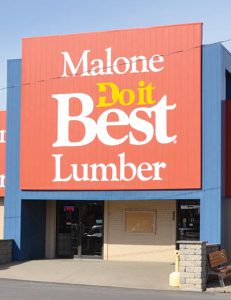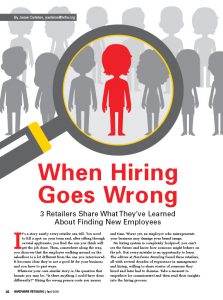Click here to download the PDF of this story.
It’s a story nearly every retailer can tell. You need to fill a spot on your team and, after sifting through several applicants, you find the one you think will get the job done. Then, somewhere along the way, you discover that the employee walking around on the salesfloor is a lot different from the one you interviewed. It becomes clear they’re not a good fit for your business and you have to part ways.
Whatever your own similar story is, the question that haunts you may be, “Is there anything I could have done differently?” Hiring the wrong person costs you money and time. Worse yet, an employee who misrepresents your business may damage your brand image.
No hiring system is completely foolproof; you can’t see the future and know how someone might behave on the job. But every mistake is an opportunity to learn. The editors at Hardware Retailing found three retailers, all with several decades of experience in management and hiring, willing to share stories of someone they hired and later had to dismiss. Take a moment to empathize (or commiserate) and then read their insights into the hiring process.
Mismatched
 There’s a concept of business management, called the Peter Principle, named after the man who formulated the theory, which says that otherwise competent employees are often put into positions that require skills they do not possess. It often happens in leadership roles, where someone who might make a great employee doesn’t always make a great supervisor. Paul Gabbard, president and CEO of Malone Lumber Do it Center in Greenville, Kentucky, recalls that’s what happened once when it came time to hire a new manager.
There’s a concept of business management, called the Peter Principle, named after the man who formulated the theory, which says that otherwise competent employees are often put into positions that require skills they do not possess. It often happens in leadership roles, where someone who might make a great employee doesn’t always make a great supervisor. Paul Gabbard, president and CEO of Malone Lumber Do it Center in Greenville, Kentucky, recalls that’s what happened once when it came time to hire a new manager.
He and his team thought they found the ideal candidate. The resume was attractive. The potential hire had good reviews from others in the community and passed all the background checks. “We thoroughly vetted him, and when we were all finished, we thought we had our man,” says Gabbard.
After hiring the new manager, Gabbard invested in training, sending him to an off-site program where he could develop the skills necessary for a successful career in management. And for the next three years, the new manager dug into his new job at Malone Lumber.
“Then he hit a wall,” Gabbard says. “I think he realized he was in over his head. It was a classic case of the Peter Principle.” He didn’t have the natural abilities to perform in a management role.
Fortunately, the breakup was amicable. The manager recognized he had stepped outside of his abilities. Perhaps he would have a made a good employee elsewhere in the company, and may have had many other desirable qualities. However, he was mismatched for the job in management.
- Tips for Your Next Hire
Don’t be afraid to fire early.
As he reflects on what might have gone differently, Gabbard says he ignored his gut feeling that something wasn’t right. “Early in the hiring process, I sensed something was wrong, but ignored it,” he says. “I thought there should be more of a leadership attitude that just wasn’t there.”
Given all the resources invested in bringing on a new employee, especially a manager who requires more time to onboard, it’s easy to want to hold on to the hope they will mature into the role. “The problem is that when you start putting so much money into people, you do everything you can to hang on to them,” Gabbard says. “You don’t want to believe you made a mistake.” Sometimes, it’s best to cut your losses and move on.
Try an outside recruitment agency.
Gabbard now uses an outside recruitment agency to assist him in vetting candidates for higher-level positions. After choosing five or six candidates, he administers a test provided by the agency, which asks questions on competencies and character traits.
After looking at the results of the written test, Gabbard identifies one candidate to do a one-on-one interview with a representative from the agency. “The process is expensive and takes a bit of time, but is well worth it,” he says. “They know how to ask the right questions and find both the negatives and positives of each candidate.”
Don’t rush the hiring process.
One mistake many retailers make is to put minimal effort into hiring temporary and entry-level employees. But even though you need someone on the job quickly, you’re risking a host of nightmares such as dissatisfied customers or missed lumber deliveries if the employee doesn’t do the job properly. While the hiring process for some jobs may be more involved for some positions than others, patience is the key to success.
“Whenever you set out to take on a new employee, take your time and don’t be in a hurry,” Gabbard says. “You may only be thinking about the service you provide to your customers and think you need to get someone hired so they can keep that going. However, if you get the wrong person, you’ll end up hurting the brand you’re trying to preserve.”
Attitude or Experience?
 Len Hunt, general manager of Eastman’s Hardware in Falmouth, Massachusetts, has spent more than half of his 40-year hardware retailing career in management. He’s worked with many good, long-term employees, but also those who weren’t fit for the job. Ironically, those who aren’t the best fit are often those who, according to their resume, are well-qualified to sell hardware.
Len Hunt, general manager of Eastman’s Hardware in Falmouth, Massachusetts, has spent more than half of his 40-year hardware retailing career in management. He’s worked with many good, long-term employees, but also those who weren’t fit for the job. Ironically, those who aren’t the best fit are often those who, according to their resume, are well-qualified to sell hardware.
“There have been a few times when we’ve hired carpenters or electricians, for example, who have a lot of hands-on experience in their trades, but have no people skills,” he says. “It sometimes happens during a time when we are in desperate need of help and are willing to take a chance on someone we think is a nice person. But you just can’t put a square peg in a round hole.”
While it’s not always the case, employees hired solely for their product knowledge are not always skilled in providing the best customer service. Hunt is not always able to make up that deficiency with training, either.
Of course, he will always give new employees time to get adjusted to the retail environment. The signals may be small, but usually he can tell fairly quickly if they’re not going to work out.
For example, are they willing to stop what they are doing to help a customer? Do they acknowledge customers when they walk through the front door? An employee with good customer service skills who, for example, is unpacking boxes and restocking shelves, will not let a customer walk by without stopping to see if they need help.
“Those small incidents can tell you a lot about a person and if that’s the type of person you want to continue working for you,” he says.
- Tips for Your Next Hire
Hire based on attitude, not experience.
For Hunt, the lesson is clear. “Look for energy and attitude,” he says. “Generally, if they have those two things, they can be trained on everything else.” It may seem counterintuitive that the best employees are not necessarily those with the most product knowledge, but success in the retail world hinges on good customer service, and good customer service is often best delivered by those who have a positive attitude and strong people skills. During his interview with a job applicant, Hunt will spend most of his time just getting to know them a little better, trying to get insights into their personality and character.
Invest in your training process.
While your employees may be full of charm, customers will quickly become frustrated if those same employees know little about the products they’re selling. You’ll never know whether you’ve made a good hire if you don’t follow up with training. Without proper training, even the best new employee will soon falter. They not only need to understand the culture of your business, but also product knowledge for all the items you carry.
At Eastman’s, new employees start out part time before moving to full time for three or four months while Hunt gets an understanding of what type of employee they will be. During the training process, new hires shadow managers for a few days before they venture onto the salesfloor alone. There’s also a manager on the floor at all times who can be a resource for new employees whenever they have a question. The manager can also periodically check in on recent employees’ progress as they learn their new responsibilities.
A well-rounded training program will include selling skills and product knowledge. In addition to training on the salesfloor, online training courses can offer employees a basic understanding of the products
you carry. Once they have that basic knowledge, you’ll want to advance them to learning how to sell entire projects. These are your moneymakers, as they include add-on sales. For more information on the range of training programs available from the North American Retail Hardware Association (NRHA), visit nrha.org/training or call 800-772-4424.
After the Hire
 Raymond Fachko, a third-generation retailer who has spent the past 40 years operating Brandies Ace Hardware in Callahan, Florida, is aware that what happens after the hire is just as important as the hiring process.
Raymond Fachko, a third-generation retailer who has spent the past 40 years operating Brandies Ace Hardware in Callahan, Florida, is aware that what happens after the hire is just as important as the hiring process.
Fachko recalls one employee he hired because he believed the applicant was credible, even though his criminal record wasn’t completely clean. Fachko was willing to overlook past faults for a person with the right attitude trying to make a new start in life.
“He was honest about his past and his explanation matched the background check,” says Fachko. “He also exhibited a desire to do the right thing and support his family. So we hired him to work on the salesfloor.”
For a while, it appeared the new employee was a strong investment. He had a friendly personality, was increasing his hardware knowledge and getting high approval from customers. He even had the potential to be the next store manager, Fachko says.
Then, after nearly two years on the job, that employee’s behavior began to change. The changes were subtle, such as spending more time at the computer and seeming less engaged with his work. But there was nothing Fachko could concretely identify as wrong, not until he began reviewing footage on his newly installed surveillance system. Fachko caught him forging signatures and faking returns. “We got just enough evidence for a grand theft conviction,” he says. “But it was evident that this person had been stealing for quite a while.”
- Tips for Your Next Hire
Look for trouble signs.
Hiring someone who has a criminal record isn’t necessarily the wrong move. Sometimes infractions are minor, one-time mistakes. There’s a case to be made for overlooking past mistakes and offering people new opportunities. And any employee, regardless of record, who’s not subject to some type of accountability has the potential to backslide into negative behavior.
The real issue, says Fachko, is having accountability standards in place, being aware of when something starts to go wrong and taking action to fix it. “It’s a consequence of being perpetually short on help in a small store,” he says. “The normal checks and balances can easily be overlooked.” Being understaffed means that managers who should be looking for signs of trouble among the employees have less time to do that. Having a store security system that monitors POS transactions and keeping a close watch for signs of theft will alert you to trouble soon after it happens.
Focus on character.
Early in the interview process, Fachko spends most of his effort discerning the character of the prospective employee. “We just try to get a feel for where they are now and where they are headed,” he says. This conversation takes place before running any background checks, driving record or credit checks, so it gives the applicant the opportunity to be honest and talk about anything in their history that needs an explanation.
He also puts stock in the opinion of others in the community he’s known for a long time. “The biggest green flag is when someone you know and respect has spent time working around a person and says ‘I’d hire them in a minute.’ That is music to my ears.”
Use simple skills tests.
Fachko has found that a few simple techniques go a long way to weeding out the wrong candidates. His application process includes a skills test with basic math and problem-solving questions.
NRHA’s version of a basic skills test is available for download at TheRedT.com/skills-test. While the test is simple, many retailers have found it is a good first step to narrowing the field of applicants.
 Hardware Retailing The Industry's Source for Insights and Information
Hardware Retailing The Industry's Source for Insights and Information









